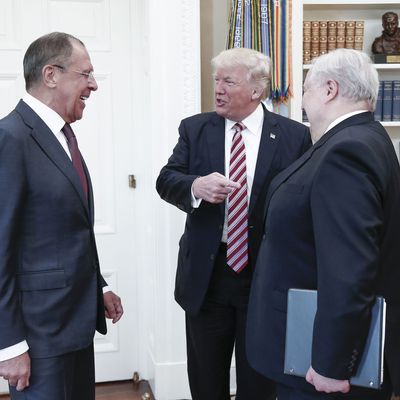
On Monday evening, the Washington Post reported that Donald Trump had disclosed highly classified information about the Islamic State during his Oval Office meeting with Russian foreign minister Sergey Lavrov and ambassador Sergey Kislyak last week.
This was a problem for the White House.
The president has the legal authority to share any information with whomever he chooses. But he also has legal authority to promise a pardon to every Trump voter who commits a federal crime against a Democrat. Can and should are very different words.
And if the Post’s report was true, then Trump most definitely should not have shared the information he did. For one thing, that information was provided to the U.S. by an ally who did not give America permission to share its intelligence with Russia. For another, Trump reportedly disclosed the city that this intelligence was gathered in — a detail that would make it easier for Russian intelligence agents to deduce the sources and methods that generated the information.
Oh, and the president fired the man leading an investigation into his campaign’s alleged collusion with the Russian government less than 24 hours before he supplied “code-word information” to Sergey and Sergey in the Oval Office. (Won’t someone please think of the optics?)
But the White House was prepared for this crisis. They knew what the president did last Wednesday. They had placed calls to the NSA and CIA to try and “contain the damage,” according to the Post. Given the administration’s sievelike nature, it couldn’t have been a shock that word of Trump’s loose lips leaked to the press.
Plus, the White House’s crisis PR muscles were freshly flexed. The handling of last week’s Comey firing was widely regarded as a disaster, but mistakes are how we learn. And so, on Monday night, the administration’s response was competent and coordinated. National Security Adviser H.R. McMaster — perhaps the administration official with the most mainstream credibility — came out and forcefully denied things that the Post hadn’t reported. With legalistic rigor, McMaster lambasted the claim that Trump had divulged “sources or methods” (the Post reported that he had divulged information from which sources or methods could potentially be derived). McMaster concluded with a seemingly definitive declaration: “I was in the room. It didn’t happen.” (Never mind that it was not clearly defined).
Secretary of State Rex Tillerson took a similar approach. Deputy National Security Adviser Dina Powell offered a flat denial. As did the administration’s friends in Moscow.
It’s unclear how Russia would know what information is and is not classified by the American government. But whatever. They did their part. The White House had its story, and it was sticking to it.
Was it plausible that so many anonymous White House officials would leak this story to the Post, and then BuzzFeed and the New York Times? Not really. But McMaster had provided an airtight rejoinder to such complaints: “On-the-record accounts should outweigh those of anonymous sources.”
The damage was controlled. The humiliation of the Comey saga would not be repeated.
And then the president woke up Tuesday morning, posted two tweets, and exposed his administration’s most respected officials as craven liars.
Here, Trump does not explicitly say that he shared classified information with the Russians. But the Post’s report indicated that the intelligence concerned the Islamic State’s plans for executing attacks on airlines. And the phrase “which I have an absolute right to do” reads as invocation of the president’s privilege to share classified information.
Trump’s defense is relatively candid, and, thus, in a sense, more convincing that McMaster’s: If Trump has information that could help Russia avert an act of mass murder against its civilians, perhaps there is a “humanitarian” reason to share it.
But then, Trump does not acknowledge the fundamental problem with his disclosure: He shared information that America was provided on the condition that we didn’t share it. Violating that agreement doesn’t just jeopardize the cooperation of the ally in question (reportedly Jordan), but also the trust of every other ally who doesn’t want their intelligence slipping into Russian hands. In fact, anxieties about Trump’s capacity to keep a secret were already (reportedly) widespread in intelligence circles, even before he took office.
The problem here is bigger than Russia. Whatever one makes of Trump’s relationship to Putin’s regime, does anyone really have confidence that the president wouldn’t try to impress a celebrity friend, or Mar-a-Lago guest, by giving them the inside scoop on Al Qaeda?
In the past two weeks, Trump has demonstrated that he lacks the discretion to avoid publicly suggesting that he fired the FBI director because he wanted to obstruct justice; or that he is secretly recording White House conversations; or that he really did share highly classified information with the Russians.
In other words: On Tuesday morning, the president tried to rebut reports that he says things he’s not supposed to say by saying something he wasn’t supposed to say.






























